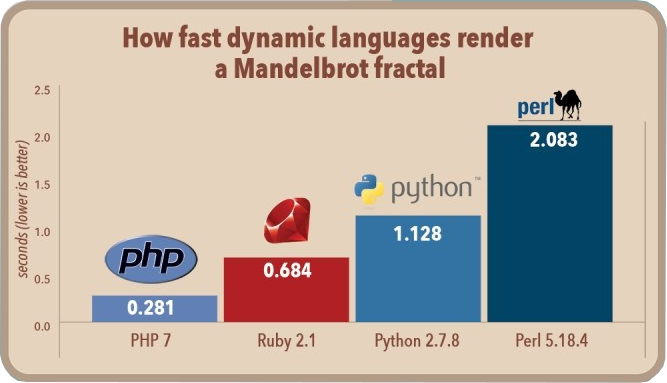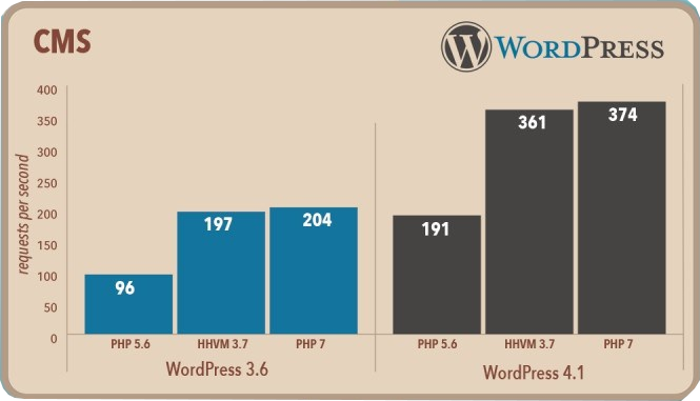The new features of PHP 7
by Enrico Zimuel - @ezimuel
Senior Software Engineer
Zend Technologies, a Rogue Wave Company (USA)
Codemotion, Milan, 25th Nov. 2016



PHP
- PHP: Hypertext Preprocessor
- The most popular server-side language: PHP is used by 82.3% of all the websites (source: w3techs.com)
- Used by Facebook, Wikipedia, Yahoo, Etsy, Flickr, Digg, etc
- 21 years of usage, since 1995
- Full OOP support since PHP 5
PHP ecosystem
PHP 7
Released: 3 December 2015
Last major was PHP 5, 13 July 2004 (11 years!)
Last release is 7.0.13 (10 Nov 2016)
PHP 6 ?
Unicode support at the core language level
Not released, project is abandoned
PHP deadlines
| Version | Release | Supported until |
| 5.3 | 30 June 2009 | 14 August 2014 |
| 5.4 | 1 March 2012 | 3 September 2015 |
| 5.5 | 20 June 2013 | 21 July 2016 |
| 5.6 | 28 August 2014 | 31 December 2018 |
| 7.0 | 3 December 2015 | 3 December 2018 |
| 7.1 | December 2016? | 3 years |
PHP7 in a nutshell
- Great performance (thanks to PHPNG)
- Return/Scalar Type Declarations
- Cryptographic secure pseudo-random number generator (CSPRNG)
- Anonymous Classes
- Combined Comparison (Spaceship) Operator
- Null coalescing operator
- New Error hierarchy
Performance
PHPNG, PHP Next Generation
Project by Dmitry Stogov (Zend)
New data structure management in the PHP engine
Great performance improvement!
Benchmark
$a = [];
for ($i = 0; $i < 1000000; $i++) {
$a[$i] = ["hello"];
}
echo memory_get_usage(true);
| PHP 5.6 | PHP 7 | |
| Memory Usage | 428 MB | 33 MB |
| Execution time | 0.49 sec | 0.06 sec |
Other languages
 PHP 7 is also faster than Python 3!
PHP 7 is also faster than Python 3!
Wordpress

Case studies
Return Type Declarations
function foo(): array {
return [];
}
function bar(): DateTime {
return null; // invalid
}
More information: PHP documentation
Scalar Type Declarations
declare(strict_types=1);
function sendHttpStatus(int $statusCode, string $message) {
header('HTTP/1.0 ' .$statusCode. ' ' .$message);
}
sendHttpStatus(404, "File Not Found"); // ok
sendHttpStatus("403", "OK"); // fatal error
function add(float $a, float $b): float {
return $a + $b;
}
add(1, 2); // float(3)
More information: PHP documentation
CSPRNG
Cryptographically secure pseudo-random number generators
// generates a random number between 1 and 100
$num = random_int(1,100);
// generates a random string of 1 Kb
$bytes = random_bytes(1024);
More information: PHP documentation
Anonymous Classes
/* return an anonymous class */
return new class($controller) implements Page {
public function __construct($controller) {
/* ... */
}
/* ... */
};
class Foo {}
$child = new class extends Foo {};
var_dump($child instanceof Foo); // true
More information: PHP documentation
Spaceship operator
A <=> B
0 if A == B, 1 if A > B, -1 if A < B
echo 1 <=> 1; // 0
echo 1 <=> 2; // -1
echo 2 <=> 1; // 1
echo "a" <=> "a"; // 0
echo "a" <=> "b"; // -1
echo "b" <=> "a"; // 1
Null coalescing
?? operator
// Fetches the value of $_GET['user'] and returns 'nobody'
// if it does not exist.
$username = $_GET['user'] ?? 'nobody';
// This is equivalent to:
$username = isset($_GET['user']) ? $_GET['user'] : 'nobody';
// Coalescing can be chained
$username = $_GET['user'] ?? $_POST['user'] ?? 'nobody';
New Error hierarchy
Throwable: Error, Exception
function call_method($obj) {
$obj->method();
}
try {
call_method(null); // oops!
} catch (Error $e) {
printf ("Error: %s\n", $e->getMessage());
} catch (Exception $e) {
printf ("Exception: %s\n", $e->getMessage());
}
More information: PHP documentation
Much more...
- Consistent 64-bit support
- Fix list() behavior inconsistency
- Filtered unserialize()
- Group use declarations
- Closure::call()
- Expectations
- ...
Check the PHP 7 new features at php.net
PHP 7.1
- Nullable types
- Void return types
- Deprecation of Mcrypt ext
- Support of Authenticated Encryption in OpenSSL
- Support class constant visibility
- Iterable pseudo-type
- ...
Check the PHP 7.1 new features at php.net
Thanks!
Contact me: enrico.zimuel [at] roguewave.com
Blog and web site: www.zimuel.it
Follow me: @ezimuel

This work is licensed under a
Creative Commons Attribution-ShareAlike 3.0 Unported License.
I used reveal.js to make this presentation.